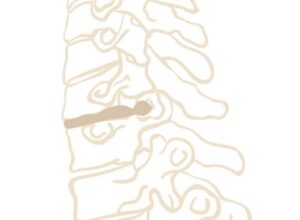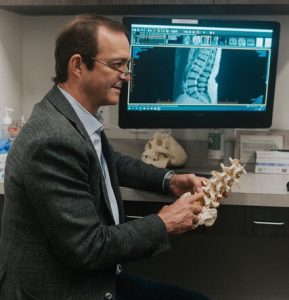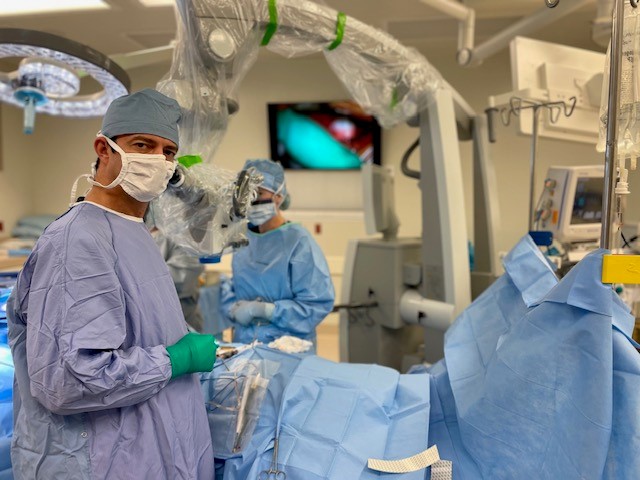Herniated Cervical Disc Treatment In Dallas
Home | Spine Conditions | Herniated Cervical Disc Treatment In Dallas

The cervical spinal vertebrae are separated by discs comprised of gelatinous and fibrous materials, which provides both shock absorption and structural integrity. The annulus, or the outer ring of the disc, has fibrous bands that are connected to the seven cervical vertebrae. When the disc’s gel-filled nucleus protrudes through the fibrous ring, this is known as disc herniation. There are several stages of cervical disc herniation, which can cause inflammation and compress the spinal cord and surrounding nerves.
What Are Herniated Cervical Discs?
A protrusion or prolapse occurs when the outer disc ring remains intact but bulges outward, pressing against nerves. If the gelatinous center perforates the fibrous wall but remains in the disc, it is known as an extrusion. The last stage of a herniated cervical disc, also known as a ruptured disc or a herniated disc, occurs when the gelatinous center moves out of the disc wall into the spinal canal.
Causes of Cervical Herniated Discs and Risk Factors

The main causes of herniated cervical discs are age-related degeneration and trauma or acute injury. With age, the cervical discs gradually lose water, becoming more rigid and therefore less able to cushion the vertebrae.
Trauma to the cervical discs may result from a variety of injuries including:
- Motor vehicle accidents
- Sports injuries
- Improper lifting of heavy objects
- Connective tissue disorders and other abnormalities of the cervical vertebra – are possible but less common causes.
Risk factors for the development of herniated discs include:
- Age
- Poor posture
- Sedentary lifestyle
- Tobacco use
- Genetics
Cervical Herniated Disc Symptoms
 A herniated cervical disc can cause neck, shoulder, and arm pain. If the disc is exerting pressure on nerve roots (radiculopathy), other symptoms can include:
A herniated cervical disc can cause neck, shoulder, and arm pain. If the disc is exerting pressure on nerve roots (radiculopathy), other symptoms can include:
- Numbness or weakness in the shoulders
- Tingling or pins and needles sensation in the upper body that extends to the fingers
- Weakness in the hands or arms
- Burning or prickling sensation in the neck
- Electric-like pain that radiates in the neck, shoulders, or arms
- Back or neck pain that is temporary but severe
A large cervical disc herniation that compresses the spinal cord can produce more serious side effects like:
- Weakness or numbness in the legs
- Balance difficulties
- Loss of bladder control

Cervical disc herniations that occur as part of the natural aging process generally result in a gradual onset of symptoms. While the symptom onset can be slower, the damage to the spinal cord and nerves can be significant.
How Are Herniated Cervical Discs Diagnosed?
 A physical examination of the patient and clinical history is accompanied by one or more of the following tests to diagnose the spine condition.
A physical examination of the patient and clinical history is accompanied by one or more of the following tests to diagnose the spine condition.
- Dynamic radiography of the cervical spine
- Imaging studies such as a MRI or CT scan
- Myelogram that uses contrast dye to identify spinal canal problems
- Nerve conduction studies
Cervical Herniated Disc Surgery & Non-Surgical Treatments
Non- Surgical Treatments
The majority of cervical disc herniations can be effectively managed without spine surgery. Associated pain should resolve within 4-6 weeks, and patients may be prescribed:
- Nonsteroidal anti-inflammatory drugs (NSAIDs)
- Muscle relaxants
- Analgesics
- Steroids to reduce inflammation.
In addition the following can help expedite recovery:
- Cold-heat treatments
- Massage
- Specific neck exercises
- Rest
Herniated Cervical Disc Surgery
Some patients may benefit from epidural steroid injections to mitigate pain and ease inflammation. Electrical muscle stimulation and ultrasound may relieve spasms and relax muscles.

Cervical spine surgery may be required when more conservative treatments fail to resolve the symptoms. Depending on the condition, any of the following surgical procedures may be indicated.
- Cervical Microdiscectomy and Fusion – a minimally invasive procedure that removes the damaged disc
- Cervical Artificial Disc Replacement — a prosthetic disc replaces the herniated disc
- Cervical Spinal Fusion Surgery – uses bone graft material and a spacer to make the vertebrae more stable after a discectomy
Consult a Leading Dallas Spine Specialist and Neurosurgeon
Dr. David W. Barnett has been in practice for more than 26 years and is a leading neurosurgeon in the Dallas-Fort Worth area. If you have tingling, pain, or other symptoms of a herniated cervical disc and would like to schedule an appointment with Dr. Barnett, please contact us today.
Conditions
Seeking a second opinion?
Dr. Barnett’s 26 years of experience lends to a level of advice and treatment that will bring an end to your back pain.
Learn More >
What Our Patients Have to Say
From start to finish, Dr. Barnett and his staff were always informative and professional. Dr. Barnett performed my neck surgery and lower back surgery all during a pandemic and everything worked out perfect. Highly recommend Dr. Barnett. Top notch.
-Healthgrades
Contact us to schedule a consultation and let us help you start feeling better today.

Dr. Barnett’s 26 years of experience lends to a level of advice and treatment that will bring an end to your back pain.
Contact us to schedule a consultation and let us help you start feeling better today.

Dr. Barnett’s 26 years of experience lends to a level of advice and treatment that will bring an end to your back pain.
Contact us to schedule a consultation and let us help you start feeling better today.
Dr. Barnett’s 26 years of experience lends to a level of advice and treatment that will bring an end to your back pain.

